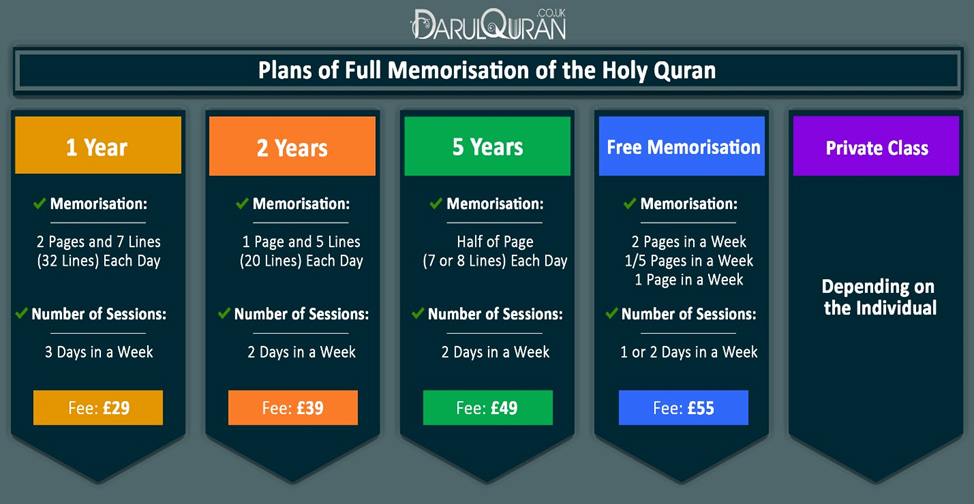How to Memorise (Hifz) the Quran?
The Quran is Islam’s holy book, divided into 114 chapters, known as Surahs in the Arabic language. Each Surah consists of individual verses called Ayahs, also in Arabic. During prayers, entire Surahs are recited from memory with the aim of drawing closer to Allah (SWT) and establishing a connection with Him, and purifying one’s heart. Reciting the book of Allah is mentioned alongside establishing Salaah and spending in the way of Allah. This clearly emphasizes that reciting Quran is among the best of good deeds. By memorising the Quran, we strive to recite Allah’s words in our daily lives. In this article, we address one of the most essential questions: How to memorise the Quran?
- When it comes to memorising the Quran
there are specific guidelines to follow for better results. Whether you aspire to be a professional memoriser (hafiz), or simply improve your memorisation, it’s important to pay attention to methods, revisions, timings, diet and more. You can find more details on these below. Sincerity (Ikhlas)
Purification of one’s intention and the correction of one’s desire are obligatory. This also applies to dedicating focus in memorisation (hifz) of the Quran for the sake of Allah, the Sublime and Exalted, with the aim of attaining success in His Paradise and earning His pleasure.
Furthermore, it is for securing those mighty rewards which are reserved for those who recited and memorise the Quran.
In the Holy Quran, Allah Almighty commands: I have been commanded that I worship Allah making the Deen sincerely for Him.” [Zumar 39:11]
It is also mentioned in the Quran: “So, worship Allah, making the Deen sincerely for Him. Is it not to Allah that sincere worship is due?” [Zumar 39:2-3]
Hence, it is important to understand that the foremost consideration should be your intention. Ensure that your intention is solely for the sake of Allah almighty, seeking His Pleasure so that inshAllah, with His Mercy, we hope to be rewarded in the hereafter. It should not be to display your accomplishments to others. Sincerity is not a one-time event rather it’s an ongoing struggle that requires continual renewal.
- Choosing the Best Time for Memorisation
If you believe that the first thing you should do in your day is memorisation, – to the extent that you do so before your breakfast because this is your spiritual nourishment, or if you feel that the best time to memorise is after your daily prayers, this part of the article is for you.
It is important to identify suitable timings in your day. Is it more effective for you to memorise in the morning, afternoon, evening or at night? Once you have determined this, strive to follow that schedule.
Its worth noticing that from a scientific perspective, research has indicated that learning is most effective between 10 am and 2 pm and again from 4 pm to 10 pm, when the brain is in an acquisition mode. Conversely, the least effective learning time is typically between 4 am and 7 am. However, if, like most people, you believe that the morning is the best time for memorisation (hifz), it’s important to know that our brains tend to be sharpest in the morning after a restful night’s sleep and a nourishing breakfast. The natural light available at this time is also beneficial for your eyes and helps keep you alert.
Even if you think that afternoon is better for you, science tells us that learners’ brains are adept at integrating new information with what they previously learnt. During this time of day, learners are able to create connections and make the information they have learned more meaningful.
Mornings and afternoons are considered better for memorisation(hifz), primarily because if you encounter challenges or get stuck midway through your memorisation, you have ample time to work on it during the day.
On the other hand, if you find that you have more energy and focus later in the day, here is some information to consider. Memorising during this time can also help to enhance your concentration and creativity as there are typically fewer distractions, and with everyone asleep, there is a sense of peace and quiet. Moreover, sleeping after memorisation is said to help consolidate information and improve recall. However, it is important to ensure that you are getting an average of 8 to 9 hours of sleep each night.
- Methods of Memorisation
When you embark on your memorisation (hifz) journey, its crucial to discover a suitable. To do this, you should familiarize yourself with different memorisation methods. In this section, we will focus on some of the primary methods, such as listening to Qari’s recitations, repetition, and writing.
Listening to a Qari’s voice is particularly significant. Initially, you should listen to a qualified Qari who follows correct tajweed rules and recitation. Then, try to recite along with them. I In the third step, you should recite it independently. This process should be applied for all verses. Another method is to repeat the verse three times and then proceed to the next two verses. After every three verses, come back and repeat all of them. If you are good at writing and learn better by writing new things, this method will work well for you. Try to write the page you want to memorise (hifz), but don’t forget the details and pay attention to the verse numbers too.
Here is a list of some methods:

- Correcting Pronunciation and Recitation
- Using the Same Copy of the Quran (Mushaf)
- Adhering to a Daily Limit for Memorising the Quran
- Linking the Verses
- Continual Recitation and Revision
- Understanding Is the Way to Memorising the Quran
- Reciting in a Melodic Tone
- • Don’t forget that you need to memorise (hifz) or at least review every day. Try to establish a daily routine.
- Surround Yourself with Recitation: Listen to the Quran. Before you start memorising
listen to what you are about to memorise. You can listen while driving, cooking, sleeping, or working. The more you listen and repeat, the more effective your memorisation will be. Repetition is one of the most significant ways to have a successful memorisation.You can listen to recitations from the best reciters by clicking on this link: https://darulquran.co.uk/intonations/ - Role of Translation
Before memorising the verses, it is essential to read their translations. Start by reading the translation, attempting to match the Arabic words with their meanings. This approach not only provides insight into the entire page’s context but also enhances your memorisation process. Understanding the meanings of the verses can significantly aid in memorisation, as you connect the words with their intended significance.
Consider reading the page’s meaning before you begin your memorisation (hifz). This practice can be a valuable tool in your memorisation journey. Additionally, you can combine tafsir (exegesis) with memorisation to see how they complement each other and enhance your understanding of the Quranic text.

- Your diet
Diets rich in fruits, vegetables, whole grains, legumes, fish, healthier fats, and herbs or seeds promote brain-boosting memory function. These foods include fruits such as berries, avocado, watermelon, and grapes. Watermelon, for example, contains a high concentration of lycopene, another powerful antioxidant. Moreover, it’s a valuable source of pure water, which benefits brain health. Even mild dehydration can reduce mental energy and impair memory.
Healthier fats are far superior to regular fats. Olive oil, for instance, provides monounsaturated fat, which can lower LDL cholesterol levels when used instead of saturated or trans fats. Vegetables also play a crucial role in enhancing memory and memorisation (hifz). Leafy greens, in particular, are rich in folate, which can improve memory by reducing inflammation and enhancing blood circulation to the brain.

- Stay consistent
Avoid jumping around. Stay consistent in your approach. If you encounter difficulty with a particular Surah, don’t attempt to skip ahead or jump to another one. Instead, stick to the established order. This way, you will experience the satisfaction of completing a Juz without leaving any portions here and there in your memorisation (hifz) journey. - Finding the Best place for memorising
While the ideal place for memorisation may vary from person to person, we’ve compiled a list of five ideas that are often successful. Perhaps at least a few of these will work well for you:

- The library: Tried and tested, libraries are excellent spaces for memorisation.

- A Quiet Home: If you have family living nearby, consider a cozy home with a dining room table and home-cooked meals. It can be just the right setting to inspire a long memorisation session.

- Outdoors: Discover a peaceful spot outside, like a picnic table, and study in the fresh air. Sometimes, taking your memorisation outside can breathe new life into your studies.

- On the Bus, Train, or Taxi: If you commute daily by bus or train, make the most of that time to memorise verses. It can free up extra time for other activities like cooking, reviewing, and relaxing.
- Techniques to Keep in Mind
There are techniques that you can employ if you want to enhance your brain’s function and become a more fascinating memoriser (hafiz). In this paragraph, you’ll become familiar with these techniques, which you can easily apply to other subjects you wish to learn. These techniques are suitable for children, teenagers, and adults, and they can be integrated into your daily routines.
A. Sleep on It: Ensure you get a good night’s sleep or take a power nap after learning something new. Research has shown that individuals who slept for eight hours after learning new information, such as faces and names, had better recall compared to those who didn’t get sufficient sleep. This applies to memorising verses and Ayas as well, as sleep helps reset our brains and is crucial for memory and learning.
B. Get Moving: Just as sleep is vital for both physical and mental health, so is exercise. Our brains require oxygen to function effectively, and to obtain this oxygen, we need a healthy flow of oxygen-rich blood to our brains. Exercise significantly improves blood flow to the brain.
C. Mnemonics Help You Remember More: In addition to leading a healthy lifestyle, specific memory techniques can enhance your ability to remember details when learning. “Mnemonics” refers to any system or method designed to aid memory. It often involves patterns of letters, ideas, or associations, such as using “ROYGBIV” to remember the colors of the rainbow. For your memorisation, you can identify key words on each page and highlight them. This technique will help you understand what you’re memorising and provide cues for remembering the material.
D. Create a Memory Palace:
“The number one technique that we top memory athletes use is still and will always be the memory palace. If someone were to learn one thing, it should be that.”
Nelson Dellis, four-time USA Memory Champion
The memory palace is a mnemonic device that extremely useful in memorisation—and it deserves its own section. Invented by orators in ancient Roman and Greek times, the memory palace (or mind palace or “method of loci”) technique is both effective and enjoyable to use. Whether you are trying to remember a page you need to memorise, details of the page you are working on (like verse numbers, page numbers, or even and odd verses), or your previous revisions, this technique can be immensely helpful. The reason it works is because you visually associate what you want to remember with places you already have strong memories of.
Here’s how to use the memory palace technique:
- Imagine yourself standing in your memory palace. Your own home is a great place to start, even if it’s not a palace.
- Mentally walk through this palace, noting distinctive features you can use to store the things you want to remember. Each stop on that path is a “loci” where you can peg an idea or object. For instance, your front door might be one loci, the table in your foyer a second loci, and a lamp in your living room another. Memorise these features so that when you think of your palace, the route and objects in it will be imprinted in your mind.
- Associate what you need to remember with the loci in your palace. For example, if you had a grocery list, imagine milk flooding over the front door from the inside, like a waterfall of milk. Then, as you reach the foyer, picture the table buckling under the weight of chocolate chip cookies stacked on it up to the ceiling. And instead of a lightbulb in your living room lamp, visualize fluorescent yellow bananas.
Using this memory palace technique can significantly enhance your memorisation capabilities.
- Write it!
According to Professor Kuniyoshi L. Sakai, a neuroscientist at the University of Tokyo and the corresponding author of the research recently published in Frontiers in Behavioral Neuroscience, paper is actually more advanced and useful compared to electronic documents. This is because paper contains unique information that enhances memory recall.
When you write by hand, you provide a boost to your brain’s encoding process. Encoding is the process of sending information to your brain’s hippocampus, where a decision is made to either store the information long-term or discard it. When you write something by hand, the complex sensory information involved increases the likelihood that the knowledge will be retained for later use.
In essence, writing by hand compels your brain to process information in a more detailed manner, facilitating successful storage of that information in your memory.

- What is the role of timetable in Quran Memorisation?
A memorisation timetable is a useful and cost-effective tool that can help you take control of your memorisation time. It provides you with a clear overview of your goals and the time available to achieve them. If you want to get organized and stay motivated to perform at your best, consider creating a personalized memorisation timetable. Here are some ways to follow it for optimal results:

A. Make a list of your responsibilities.
This means you should list what you need to cover, whether it’s new memorisation, long-term revision, or short-term revision. Also, consider choosing a time period, either a month or a week. You might not think of everything right away, and that’s okay—you can add it later.
B. Consider optimal times of day for memorisation.
Take some time to think about when you do—or would do—your best memorisation. Are you a morning person or a night person? Thinking about this now will help you schedule important memorisation sessions during your most productive hours.
- When completing this step, try to focus solely on your memorisation schedule, setting aside other responsibilities like work.
C. Decide on a format.
You can create your timetable on paper or in a digital format, such as a spreadsheet or a mobile app.
- Spreadsheet programs like Microsoft Excel or Apple Numbers offer straightforward solutions. Many word processing programs also have templates for this purpose.
- You may opt for an online solution. One well-reviewed program with both a mobile app and web interface is My Study Life.
- Even if you’re frequently online or on your phone, a physical paper timetable may be better for you, especially if you can’t use devices.
- Both paper and digital study timetables have their advantages. A digital timetable is easier to set up and modify, while a printed timetable can accommodate numerous small changes and be kept with you. A printed version might also be more enjoyable to personalize with colors.
- Group classes or private classes?
Group lessons can be a fun way to practice and develop the crucial skill of ‘muscle memory.’ On the other hand, private classes are more suitable if you want to focus on your memorisation individually. Since learners have varying speeds of memorisation—some prefer to review, some aim to memorise more than three pages per week, while others opt for a slower pace—you need to consider whether your approach aligns with the group’s goals if you choose a group class. In group settings, you may not always be able to follow your plan directly, and you may need to exercise patience at times. - Try to test yourself
When you test yourself, you’re essentially asking questions about the material. The testing effect is effective because it enables you to access the information in your memory successfully, making your memories stronger and easier to retrieve later.
Another reason why studying by testing is so effective is that it’s best to memorise in a way that aligns with how you’ll be tested. In other words, the more your memorisation process resembles the testing situation, the more likely you are to remember the information during the actual test.
To sum it up, when you’re learning something new, you need to be actively engaged. Avoid passive reading or merely listening to a Qari. Instead, after you’ve been exposed to new material, challenge yourself with self-testing. It may require some effort to pass the tests you give yourself, but that effort will pay off in the long run.
And remember, this approach applies not only to memorising the Quran but also to any situation where you need to learn something new. Don’t just study; test yourself.”
If you aspire to become a professional memoriser, it’s crucial to pay attention to various aspects such as methods, revisions, timings, diet, and more, which have been discussed in this article. Ensure that your intention is solely for the sake of pleasing Allah Almighty and seeking His pleasure.
Additionally, find suitable timings during the day for your memorisation. When beginning your memorisation journey, it’s important to select a method that suits you best, and this involves understanding different memorisation methods.Gaining a comprehensive understanding of the content of each page is a fascinating way to enhance memorisation, as it allows you to grasp the meaning of verses. You can choose from various locations for memorisation and revisions, including libraries, a comfortable home, outdoor settings, or public transportation.
A diet rich in fruits, vegetables, whole grains, legumes, fish, healthy fats, herbs, and seeds can boost your brain’s memory function. Some specific foods like berries, avocados, watermelon, and grapes can be particularly beneficial.
There are techniques you can employ to improve your brain’s function and become a captivating memoriser (hafiz). These include getting a good night’s sleep or taking power naps, engaging in regular exercise to enhance blood flow to the brain, using mnemonics to aid memory, and creating a Memory Palace.
As time goes on, it’s important not to overlook the need for managing your memorisation time effectively. Establishing a memorisation timetable can provide a clear perspective on your goals and the time available to achieve them. Additionally, consider the benefits of testing, as it helps reinforce memories, making them stronger and easier to recall later.
In conclusion, if you or your child are interested in embarking on the sacred journey of fully memorising the Holy Quran, we invite you to join our online academy. DarulQuran offers a supportive and structured learning environment that allows individuals of all ages to develop a deep connection with the Quran. With our qualified teachers, flexible online learning options, comprehensive curriculum, and nurturing community, you can achieve your goal of memorising the Holy Quran. Our Memorisation course offers various plans, including one-year, two-year, five-year, and free Memorisation programs, each tailored to your time, ability, and specific requests.

Join us today and unlock the transformative power of Quran Memorisation.
For more information, visit the website of DarulQuran academy:
https://darulquran.co.uk/courses/full-memorisation-of-the-holy-quran/









Your articles not only nourish the soul but also strengthen my connection to Allah. May your efforts continue to inspire and guide us.